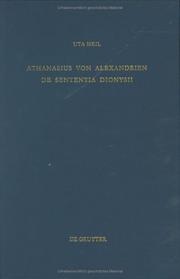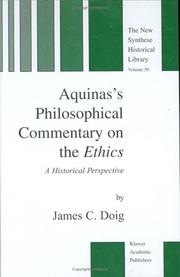| Listing 1 - 4 of 4 |
Sort by
|

ISSN: 05534003 ISBN: 3110165201 3110809893 9783110165203 Year: 1999 Volume: 52 Publisher: Berlin de Gruyter
Abstract | Keywords | Export | Availability | Bookmark
 Loading...
Loading...Choose an application
- Reference Manager
- EndNote
- RefWorks (Direct export to RefWorks)
Athanasius, --- Dionysius, --- Dionysius of Alexandria, Saint --- Athanasius Saint, Patriarch of Alexandria --- Denis, --- Athanasius --- Athanasius ‹Alexandrinus›. --- De sententia Dionysii. --- RELIGION / Christian Theology / Ecclesiology. --- Athanasius, - Saint, Patriarch of Alexandria, - -373 - De sententia Dionysii --- Dionysius, - of Alexandria, Saint, - -265

ISBN: 0792369548 904815698X 9401597715 9780792369547 Year: 2001 Volume: 50 Publisher: Dordrecht Kluwer
Abstract | Keywords | Export | Availability | Bookmark
 Loading...
Loading...Choose an application
- Reference Manager
- EndNote
- RefWorks (Direct export to RefWorks)
Is Aquinas's Sententia libri Ethicorum an interpretation of Aristotle based on `principles of Christian ethics'? Or do we have in that work a presentation of the foundation of Aquinas's moral philosophy? Professor Doig answers these questions through an examination of the historical context within which the Sententia was composed. In Chapters 1-2, the work's role as a corrective of earlier commentaries is established. Chapter 3, by examining philosophy at Paris between 1215 and 1283, reveals that the proposal by Aquinas of a moral philosophy would have been unexceptional. Chapter 4's investigation of the principles underlying the moral theory of the Sententia makes apparent that they were regarded by Aquinas as both philosophical and Aristotelian. The date to be assigned the composition of the Sententia is studied in Chapter 5, and the conclusion is drawn, that with some probability, the Sententia is its author's final proposal of moral doctrines. The closing Chapter offers a summary of that moral philosophy against the historical background brought out earlier.
Ethics. --- Thomas, --- Aristotle. --- Ethics --- Deontology --- Ethics, Primitive --- Ethology --- Moral philosophy --- Morality --- Morals --- Philosophy, Moral --- Science, Moral --- Philosophy --- Values --- Aristoteles. --- Thomas Aquinas, Saint --- Aristoteles --- Aristote --- Aristotle --- Aristotile --- Medieval philosophy. --- Philosophy. --- Ontology. --- Medieval Philosophy. --- History of Philosophy. --- Philosophy, general. --- Being --- Metaphysics --- Necessity (Philosophy) --- Substance (Philosophy) --- Mental philosophy --- Humanities --- Medieval philosophy --- Scholasticism --- Thomas, - Aquinas, Saint, - 1225?-1274. - Sententia libri Ethicorum. --- Aristotle. - Nicomachean ethics.
Book
ISBN: 0472028715 1299159869 0472901052 0472118501 Year: 2012 Publisher: Ann Arbor : The University of Michigan Press,
Abstract | Keywords | Export | Availability | Bookmark
 Loading...
Loading...Choose an application
- Reference Manager
- EndNote
- RefWorks (Direct export to RefWorks)
" Imperial Latin epic has seen a renaissance of scholarly interest. This book illuminates the work of the poet Lucan, a contemporary of the emperor Nero. This maverick but socially prominent poet, whom Nero commanded to commit suicide at the age of 26, left an epic poem on the civil war between Caesar and Pompey that epitomizes the exuberance and stylistic experimentation of Neronian culture. This study focuses on Lucan's epic technique and traces his influence through the Middle Ages and the Renaissance. Martin Dinter's newest volume engages with Lucan's use of body imagery, sententiae, Fama (rumor), and open-endedness throughout his civil war epic. Although Lucan's Bellum Civile is frequently decried as a fragmented as well as fragmentary epic, this study demonstrates how Lucan uses devices other than teleology and cohesive narrative structure to bind together the many parts of his epic body. Anatomizing Civil War places at center stage characteristics of Lucan's work that have so far been interpreted as excessive, or as symptoms of an overly rhetorical culture indicating a lack of substance. By demonstrating that they all contribute to Lucan's poetic technique, Martin Dinter shows how they play a fundamental role in shaping and connecting the many episodes of the Bellum Civile that constitute Lucan's epic body. This important volume will be of interest to students of classics and comparative literature as well as literary scholars. All Greek and Latin passages have been translated"--
Epic poetry, Latin --- History and criticism. --- Lucan, --- Technique. --- Rome --- History --- Literature and the war. --- Lucanus, Marcus Annaeus, --- Lukan, Mark Anneĭ, --- Lucain, --- Lucano, Marco Anneo, --- Lucanus, Marcus Annaeus --- LITERARY CRITICISM / Ancient & Classical. --- HISTORY / Ancient / Rome. --- Pypłacz, Joanna. --- Classics --- Anno Domini --- Julius Caesar --- Lucan --- Ovid --- Pharsalia --- Pompey --- Sententia --- Lucano, Marco Antonio --- Lucain --- Lucano
Book
ISBN: 9782356680594 2356680594 2356681817 9782356681812 Year: 2016 Volume: 55 21 Publisher: MOM Éditions
Abstract | Keywords | Export | Availability | Bookmark
 Loading...
Loading...Choose an application
- Reference Manager
- EndNote
- RefWorks (Direct export to RefWorks)
Née dans un cadre scolaire, conçue à l’origine comme un instrument de formation et d’instruction de la jeunesse, la déclamation, qui n’était d’abord qu’un moyen, suscita un tel engouement qu'elle devint aussi très vite une fin en soi : si l’on déclamait au départ pour apprendre à parler, on déclamera bientôt pour le plaisir de déclamer ; le genre oscille donc entre instruction et distraction des élites. Par les jeux intertextuels et génériques qu'elle instaure avec d’autres productions littéraires, par les liens qu'elle tisse avec son contexte juridique, politique et social, la déclamation a été un élément essentiel de la vie culturelle antique, fonctionnant parfois comme une sorte de laboratoire des idées et des formes. Les textes ici réunis prennent en compte la déclamation antique, aussi bien grecque que latine, de Sénèque le Père jusqu’aux déclamateurs de la Troisième Sophistique, et au-delà, dans une perspective croisée permettant de mieux comprendre comment la déclamation a pu être – et rester – pendant près de deux millénaires la norme de toute culture supérieure, concourant à la transmission des valeurs, esthétiques, éthiques, juridiques, politiques, et à la fabrique des élites.
Rhetoric, Ancient --- Elocution --- Public speaking --- Rhétorique antique --- --Éloquence --- --Colloque --- --2011 --- --2012 --- --Clermont-Ferrand --- --Strasbourg --- --actes --- --Rhetoric, Ancient --- --Éloquence antique --- Discours latins --- Discours grecs --- Art de parler en public --- Art oratoire --- Histoire et critique --- Histoire --- Actes de congrès. --- Éloquence antique --- Rhetoric, Ancient. --- Elocution. --- Public speaking. --- Deklamation. --- Griechisch. --- Latein. --- Actes de congrès --- --Rhetoric, Ancient. --- --2012, --- Clermont-Ferrand --- Ancient rhetoric --- Classical languages --- Greek language --- Greek rhetoric --- Latin language --- Latin rhetoric --- Oral communication --- Declamation --- Speaking --- Eloquence --- Language and languages --- Rhetoric --- Expression --- Oratory --- Reading --- Voice --- Study and teaching --- Éloquence --- Colloque --- Strasbourg --- controverse --- déclamation --- rhétorique --- sententia --- divisio --- status --- suasoire
| Listing 1 - 4 of 4 |
Sort by
|

 Search
Search Feedback
Feedback About
About Help
Help News
News